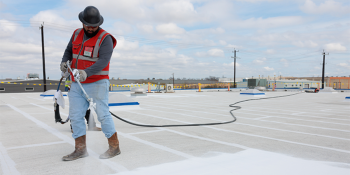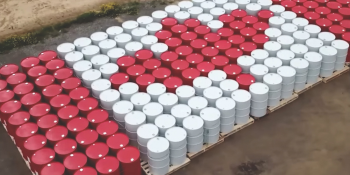Q&A Forums
How good of sprayer does it really take to spray silicone Post New Topic | Post Reply
| Author | Comments |
|---|---|
|
Kevin Gubbels
Posted: Jul 12, 2009 10:49 PM
|
How good of sprayer does it really take to spray silicone
I have been spraying acrylic on my spf roofing projects, but am switching to silicone. What kind of sprayers are you guys using for this? Does it really take a big air motor powered sprayer? will a 33:1 work or do I need better?
|
|
mason
Posted: Jul 13, 2009 07:46 AM
|
Silicone coatings are thicker than acrylics. A 30 to 1 air powered pump can work but you would require a transfer pump from the drum to the coating pump and on hot days, it may not provide sufficient pressure to atomize the coating well. A 45 to 1 pump is better but you still need a transfer pump. We would use a 5 to 1 transfer pump. Silicone coatings dry very quickly and can cause your pump to seize over night so make sure you have the pump piston in the down position at the end of the day. (your transfer pump also). Depending on the formula a skin may form on the coating in the drum overnight. A thin layer of mineral spirits on top of the coating can reduce that possibility. CAUTION: Silicone coatings are a natural release agent. So make sure you do not spray silicone over surfaces that will be sprayed with foam later on. (watch your overspray very carefully) Most folks spray a primer on their foam where they will tie in from one days work to the next. This will provide a few days UV resistance without having to spray foam over the silicone coating. |
|
Posted: Jul 19, 2009 07:21 PM
|
mason, got a roof we did last year. did 1/2 of the roof and have the other half this fall. rolled 2 coats of silicone on top of the foam. and some of it is also on the old roof that we have yet to foam. what is the solution? what can we put on the silicone so that the foam will stick? thanks. |
|
john thompson
Posted: Jul 20, 2009 08:50 AM
|
Do yourself a favor and remove (grind) EVERY bit of the silicone off before spraying the foam to the deck.You could recoat the silicone with silicone and broadcast aggregate into the wet coat then when that is dry you could spray the foam, however you risk adhesion problems if there is not enough granules in it for the foam to bite to. Nothing sticks to silicone except silicone. When I have tie in areas to do I always use and acrylic elastomeric at those areas so my foam will have no delamination issues. |
|
mason
Posted: Jul 20, 2009 11:40 AM
|
Yep, I haven't use anything that sticks well to silicone coating well. But, you might try contacting National Coatings based out of California. Bill Kirn developed a primer that is supposed to be able to allow their acrylic coating to be applied over silicone coatings. Note: I would try a very small sample area first and let it sit for a few weeks, then check the adhesion. I don't have any field performance information about the product but if you can, talk to Bill Kirn directly about the product and if it can work in your situation. |
|
Posted: Jul 21, 2009 08:18 PM
|
FYI- I use a Graco GH833 for Silicone Coatings. I have never sprayed acryllic before, but for silicone, it works fine. 7500 sq. ft at 15 mils is a full day though. I usually have to do a base one day and the top coat the next. Concerning spraying over Silicone or tying in foam, I use my building all of the time to try things out. I have foam over silicone now for right at 6 years on a flat roof with no blistering. 1/2 inch passes will blister up within six months and you can feel it within a week or two after doing. My 1 inch passes have held up fine though. Unfortunately I haven't been round long enough to be re-roofing my own roofs, but I have seen it over and as long as the passes are 1 inch or better, they seem to have held up. This is just my own observations though. Steve |
|
Dennis Davidson
Posted: Jul 22, 2009 11:06 AM
|
I've sprayed a lot of silicone. As long as you use a 45:1 or larger with a 5:1 trans pump your fine. Also, a major consideration is the hose dia. and length. Tie-ins - we stop the silicone about 3ft. from the edge of the foam and use an acrylic or urethane to cover the rest (which ever is available) till we can come back to do the rest. When you go back to spray in the rest of the roof, grind the silicone back a few feet and spray your tie-in area overlapping as little as possible. Apply three coats to this area. As far as applying anything over silicone, no manufacturer will warrant it. I saw a huge failure from a guy spraying acrylic over silicone. I've also seen delamination from foaming over silicone overspray. Personally, I wouldn't try it. |
|
Posted: Jul 22, 2009 04:16 PM
|
Hi Macs Tell me about urethane! How does it work? What do I need to spray? A good supplier that I can try? How long does it take to cure? Does it harden like fiberglass? I don't know a lot about urethane and would like to find out if it is something that I may want to start using. Steve |
|
mason
Posted: Jul 22, 2009 04:31 PM
|
There are a variety of types of urethane coatings that have been used over foam. Get a copy of SPFA technical document AY 102 Guideline to Elastomeric Coatings used in SPF Roofing. Some of the brands that have been around for a while and have good success include the moisture cured polyurethane coatings manufactured by Neogard, BASF, Gaco Western, United and Aldo Products The moisture cured polyurethanes are single component and clean up with MEK/xylene mix. You need at least a 45 to 1 pump to spray them and a horse of an air compressor (100 cfm or better) or use the hydraulically operated equivalent of a Graco 733 or better. There are also plural component urethane coatings both fast and slow cure. Some require specialized equipment similar to your foam machine and some can be batch mixed. Ask your supplier for a list of projects in your area over 10 years old that you can visit before settling in to one brand. Urethane coatings have the largest variety of physical properties, they can be either a vapor retarder or a breather coating, tensile strength from 600 to 3500 psi, have excellent chemical resistance. They have a rubber like texture and they usually have good elongation of 200 to 400%. Depending on the formula you can have an aliphatic system or a aromatic system. The aromatic systems are typically used as base coats and don't have the same degree of UV resistance as the aliphatic (although fillers can be used to improve their UV resistance.) The aliphatics usually have a higher gloss finish. Urethane coating can come in white and gray typically but may be tinted by the manufacturer for special projects in a variety of colors. Depending on the brand the coatings can last 10 to 20 years plus before the physical properties start to break down Urethane coatings are usually higher solid content than silicones or acrylics in the 80 to 100% solids by volume range so you can build up mils fairly quickly. They do have a tendency to cost more than the acrylics and comparable to the silicones (again depends on the brand) I have sprayed millions of sq ft of SPF roofing of acrylic, silicone and urethane coatings over my career and have inspected much more while in charge of field quality control with ER Carpenter and USCS. There are advantages and disadvantages to all of the coatings. ACrylics are cheaper, urethanes are better against impact and abrasion and chemical resistance and silicones just don't lose their physical properties over time. You see urethane coatings more often in refineries for tanks and vessels and in hail belt areas of the country such as around Dalls north through Oklahoma, Kansas, etc. It is also used frequently with butyl rubber base coatings in cold storage applications. Check out my article on SPF roofing at my website, masonknowles.com or give me a call at 571-239-5221 to discuss more fully. |
|
Dennis Davidson
Posted: Jul 22, 2009 07:11 PM
|
....and that's why it's called "ask Mason Knowles". Urethanes are by far the most versatile and difficult coating to use and apply. One mistake can ruin a whole drum and harden inside your hose. (been there, done that) Put in the wrong solvent and your dead. I've used about as much urethane as I have acrylics, polyureas and silicone coatings combined on roofs. I've also used urethanes on floors, tanks and primary & secondary containment too. One great thing about urethanes on foam roofs is the ability to spray foam directly over urethane coating for tie-ins or to fill low areas. The right combination of pump size, hose diameter and lengths are critical to make any production. I use a 56:1 and have sprayed urethanes as far as 450 ft. |
|
Dennis Davidson
Posted: Jul 22, 2009 07:50 PM
|
Steve Send me your e-mail address again and I'll send you some additional info on urethane coatings. Dennis |
|
mason
Posted: Jul 23, 2009 08:01 AM
|
Good information Dennis. One reason the moisture cured polyurethanes have become more prevalent is that they tend to be easier to apply without as many problems of moisture contamination, poor mix and restricted pot life. There was a time in the 80s where many exotic plural component urethane coatings were manufactured with extremely high tensile strength, elongation and UV resistance. Only problem with these systems is that they tended to have very high viscosity rates and tended to not mix well. Subsequently many of these formulas "reverted" sometimes years after application from a solid film to a semi-liquid, gummy mess that required total scarfing of the foam and coating. While at Carpenter I was put in charge of repairing more than 2 million sq ft of "reverted" coating across the country. (It was not my decision to sell the product, our company president private labeled a coating that did not have extensive field application history in order to match a very restrictive specification). It was a good learning experience (though not very profitable for our company). The lesson learned was make sure that the coating you use has a good field history and that the coating is most appropriate in the environment that it is being used. (Also, make sure the company has a very good technical rep who can help guide you through the learning process of using the new material) |
|
Wecando Samples
Posted: Oct 25, 2016 04:25 PM
|
I am considering buy this pump for spraying samples, so not going to be doing nearl as large an area at a time. We spray them in a booth so the climate is pretty consistant including the humidity as we are in South Florida. Will this pump work? Gaco Merkur http://www.toolsmartusa.com/grmex48paspc.html (4800psi) http://www.graco.com/content/dam/graco/ipd/literature/flyers/340004/340004EN-F.pdf |
|
mason
Posted: Oct 29, 2016 04:27 PM
|
The Graco Merkur line comes in a variety of sizes. You would need at the minimum a 30-1 ratio pump to install silicone and that would require a force feed transfer pump typically a 5-1 pump. As noted above, you also need a fairly large diameter feed hose and spray hoses on the pump to get enough pressure at the spray gun. Since you are spraying samples, I assume the hoses will be one length less than 50 ft. In that case, the hoses can be slightly smaller in diameter than what is used for commercial work where the hoses may stretch 200 ft and more. I would contact Graco for their recommendation for your specific application. You can get a contact number by looking up the Graco representative for SPFA at sprayfoam.org |
|
beringstar
Posted: Nov 21, 2017 07:39 AM
|
I have also sprayed all of the coatings. One thing to consider as a business owner is the challenges that you will face if you don't understand the way the products cure as it relates to your crew, your equipment, and your bottom line. Silicone is a tough product to work with. When factored into the project demands, the willingness of your crew to give a shit about your equipment, and your knowledge as an owner, it can be a painful experience to learn how to use it. Same is true with Urethane coatings. For the client you are selling to, offering these product options can be very beneficial to them, but you better know how to execute or you will be holding your head in your hands while your guys are screwing around with low pressure, bad pattern, hoses that are going bad, etc. It's quite technical to spray those products efficiently. If you are traveling any distance to the application site from the pump, a transfer pump from the material to the pump is mandatory in any application. hose sizing is very important. cleanup and storage of everything is critical. Trust me. There's a lot to know and you can have a very bad job if you are a novice. Tread lightly using silicone and urethane coatings. |
|
beringstar
Posted: Nov 21, 2017 07:39 AM
|
I have also sprayed all of the coatings. One thing to consider as a business owner is the challenges that you will face if you don't understand the way the products cure as it relates to your crew, your equipment, and your bottom line. Silicone is a tough product to work with. When factored into the project demands, the willingness of your crew to give a shit about your equipment, and your knowledge as an owner, it can be a painful experience to learn how to use it. Same is true with Urethane coatings. For the client you are selling to, offering these product options can be very beneficial to them, but you better know how to execute or you will be holding your head in your hands while your guys are screwing around with low pressure, bad pattern, hoses that are going bad, etc. It's quite technical to spray those products efficiently. If you are traveling any distance to the application site from the pump, a transfer pump from the material to the pump is mandatory in any application. hose sizing is very important. cleanup and storage of everything is critical. Trust me. There's a lot to know and you can have a very bad job if you are a novice. Tread lightly using silicone and urethane coatings. |
|
beringstar
Posted: Jan 03, 2018 01:36 AM
|
The statement " how good of a sprayer is needed" is not the right direction with silicone. This sounds to me like someone wants to put the entire success of a project on the sprayer, which is a bad mentality to have, and please no offense. This perspective is typical with larger companies who don't have anyone who cares about the differences in products, or the outcome... or is unable to take professional knowledge and implement it into the field. The sprayer is an important dynamic. However, he needs to be paid all enough to care. If he has the experience, things that need to be considered are. *is the company he works for solid enough to back him up with the right equipment? or are they asking him to do a large job with the same junk equipment and hose setup that they spray other products thru? *is the project manager paying attention to the necessary job conditions and cleanup procedures required to execute a silicone application? Working with the general contractor to make sure that the needs of the job are met? *Proper substrate preparation? critical for everything we do. * Proper shutdown procedures in every annual seasonal condition. *do your people care about your job? *does the owner or manager want to make sure his people are getting it right as they work? may require some work clothes and a bit of hands on to make it happen. Silicone is a great product but it's a nightmare. If you want to sell it , you need to take it seriously and do what it takes, financially and in the field, to make sure the processes are understood and executed to have a successful job. Once the job is done, storing and cleaning the equipment is a whole other issue or you will throw away thousands of dollars |
|
beringstar
Posted: Jan 03, 2018 01:36 AM
|
The statement " how good of a sprayer is needed" is not the right direction with silicone. This sounds to me like someone wants to put the entire success of a project on the sprayer, which is a bad mentality to have, and please no offense. This perspective is typical with larger companies who don't have anyone who cares about the differences in products, or the outcome... or is unable to take professional knowledge and implement it into the field. The sprayer is an important dynamic. However, he needs to be paid all enough to care. If he has the experience, things that need to be considered are. *is the company he works for solid enough to back him up with the right equipment? or are they asking him to do a large job with the same junk equipment and hose setup that they spray other products thru? *is the project manager paying attention to the necessary job conditions and cleanup procedures required to execute a silicone application? Working with the general contractor to make sure that the needs of the job are met? *Proper substrate preparation? critical for everything we do. * Proper shutdown procedures in every annual seasonal condition. *do your people care about your job? *does the owner or manager want to make sure his people are getting it right as they work? may require some work clothes and a bit of hands on to make it happen. Silicone is a great product but it's a nightmare. If you want to sell it , you need to take it seriously and do what it takes, financially and in the field, to make sure the processes are understood and executed to have a successful job. Once the job is done, storing and cleaning the equipment is a whole other issue or you will throw away thousands of dollars |





























